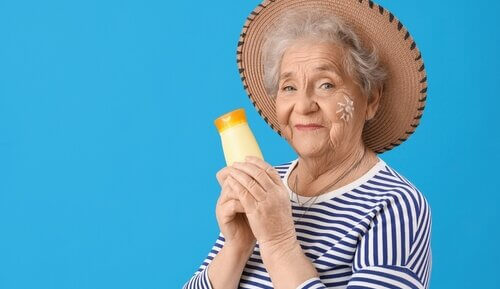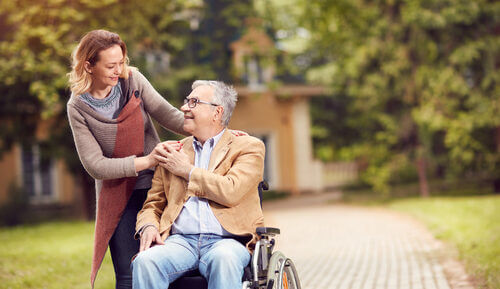
Page contents
Many people do not consume enough water, but dehydration in older people is particularly prevalent. In 2023 it was found that nearly a quarter of older people in the UK are dehydrated.
What is dehydration?
Dehydration happens when you don’t have enough fluid in your body. The body loses water every day through breath, sweat, urine and faeces. In order to prevent dehydration, these water levels need to be kept in balance.
Adult bodies are made up of up to 60% water, which is needed for the body to function properly. Losing more water than you’re taking in can inhibit your vital organs’ ability to function.
Who is most at risk of dehydration?
Dehydration can happen to anyone at any time but those most at risk are:
- Older people and people living with dementia. They can forget to drink, lose the sensation of thirst or avoid getting water because it is more difficult for them to physically do so.
- People with health conditions such as diabetes or those who take medications that act as diuretics. Diuretics make you need to urinate more often so you may be losing more water than you’re gaining. For diabetics, excess glucose that cannot be processed causes more frequent urination.
- People who drink too much alcohol. As anyone who has woken in the night after a drinking session gasping for water can attest, excessive alcohol can cause dehydration. It seems counterintuitive given that it is liquid, but alcohol acts as a diuretic.
- If you are losing fluid through vomiting, diarrhoea or sweating. People need to drink more water in the summer or after exercise for this reason. Some people with incontinence experience dehydration.
- Those with dysphagia who have difficulty with physically swallowing liquids.
Physical signs of dehydration
Every cell in the body needs water and without an adequate amount of it they can shrink, causing the organs they are part of to be unable to work as they should. Imagine the difference between a grape and a raisin.
This drying out can present visible physical effects of dehydration as the skin cells dry and body parts like the eyes and mouth lose the lubrication they need, such as:
- Dry mouth and bad breath
- Dry eyes and inability to produce tears
- Chapped lips
- Dry skin
- Loss of skin elasticity; being able to pinch the skin and take time to return to normal is often due to dehydration
- Dark urine that smells strongly. Urine should be a very light yellow in colour. Dark yellow or orange urine shows dehydration
- A craving for sugar as your body starts using up its glycogen stores
The blood also needs plenty of water to keep it flowing. Dehydration can lead to low blood pressure and an imbalance of electrolytes, symptoms of which can include:
- Heart palpitations
- Muscle cramps
- Feeling cold, from lack of blood to the skin
- Headache
- Dizziness or light-headedness
- Fatigue
- Blurred vision or temporary blindness
Cognitive signs of dehydration in older people
Dehydration can affect every organ in the body, including the brain. Lack of water and low blood pressure caused by it can prevent the brain from getting the nutrients it needs.
Cognitive and emotional signs of dehydration include:
- Difficulty concentrating
- Becoming confused, particularly for older people
- Brain fog
- Low mood
- Feeling tense or anxious
- Irritability
Long-term effects of dehydration in older people
Being dehydrated for a long period of time, or recurringly, can lead to chronic dehydration.
Chronic dehydration is extremely serious. Over time it can lead to a host of health problems, including:
- Kidney failure
- Kidney stones
- Other organ failure
- Hypovolemic shock
- Swelling of the brain
- Seizures
- Death
People with chronic dehydration are often treated in hospital with intravenous rehydration.
Tips to prevent dehydration in older people
Adults need to drink about 2 – 2.5 litres of water per day, although this varies according to your weight and lifestyle. You’ll also need to drink more if you’re exercising or it’s hot.
Use prompts and routines to get water into your day
Whether it’s a notification on your phone or a sticky note on the cupboard, reminding yourself to drink regularly can be helpful if you rarely feel thirsty.
Establishing new routines and habits can really help. You could add simple habits to your day, such as:
- Drinking a pint of water as soon as you get up
- Filling a large water bottle each morning and keeping it close by throughout the day
- Using bigger glasses and mugs than usual
- Having a pot of tea while you watch TV
- Adding flavourings to water can help you to drink more of it
Drink milk
A study by St Andrews University in 2015 found that drinking skimmed milk can keep you more hydrated for longer than drinking the equivalent amount of water.
This is because it contains lactose, protein, fat and sodium, all of which help to retain water in the body for longer.
Eat water
Food is made up of water to a certain extent, so you can get some hydration by eating. Some foods are almost entirely made of water. Tomatoes, mushrooms and cucumbers, for example, are all over 90% water.

Water-dense foods to add to your diet include:
- Salad vegetables
- Vegetables in general, particularly leafy greens and mushrooms
- Fruit
- Soup and broth
- Yoghurt
- Sugar-free jelly
Adding a small amount of salt to food can increase your thirst and prompt you to drink more.
You can also buy sweets called Jelly Drops that are specially designed to help older people and people living with dementia to stay hydrated. You can find out more about Jelly Drops.
Take electrolyte supplements
Electrolytes are charged minerals and compounds that are essential to the body. They include magnesium, potassium, bicarbonate, sodium, calcium, chloride and phosphate.
Some of these electrolytes, such as sodium, can help the body to retain water, rather than losing it through urine. Taking electrolyte supplements or drinking electrolyte water can also alleviate some physical symptoms of dehydration.
You should discuss any supplements you are taking and your dehydration with your doctor.
Make drinks more palatable
If you don’t like water, drinking fluids that you prefer is better than not drinking fluids at all (within reason – drinking a pint of gin is considerably worse for you than not drinking a pint of water). If your beverage of choice is coffee, caffeine can have a mild diuretic effect, but not enough to dehydrate you.
Many people experience dysphagia (difficulty swallowing) which can make drinking physically challenging. You can buy thickening powder to make drinks easier to swallow.

